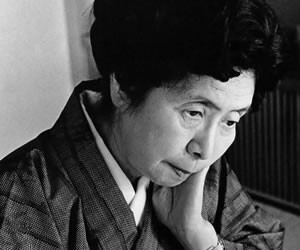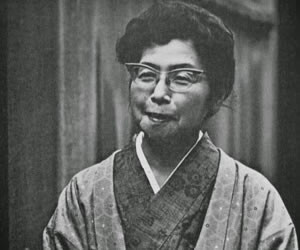

Last Updated: 02 Oct, 2023 | Views: 1008
Age: 81
Profession: Writer
Other Profession(s): Playwright
Famous For: Masks (Novel)
Higher Education: Japan Women's University
About (Profile/Biography):
Fumiko Enchi was born on 2 October 1905 in Tokyo, Japan. She is the leading women writer in Japan and is known for writing about sexuality, gender, human identity, and spirituality. Fumiko Enchi was the second daughter of Tokyo Imperial University linguist professor Ueda Kazutoshi, and his wife Tsuruko. Fumiko Enchi could not attend classes in school regularly, so her father decided to keep her at home. Private tutors taught Fumiko Enchi English, French, and Chinese literature.
Fumiko Enchi Career:
Fumiko Enchi Earlier Literary Career:
● Fumiko Enchi literary career began in 1926 with a one-act stage play, Birthplace, published in the literary journal Kabuki, which critics well received.
● Fumiko Enchi noted the sympathies with the proletarian literature movement.
Fumiko Enchi Published Literature Work:
● A Restless Night in Late Spring was published in September 1928 in the magazine Women's Arts and performed at the Tsukiji Little Theatre in December 1928.
● Fumiko Enchi began to write fiction novels, but unlike her smooth debut in a playwright, she found it hard to publish her stories.
Fumiko Enchi Wrote Novels
● Fumiko Enchi's early novels, such as The Words Like the Wind (1939), The Treasures of Heaven and Sea (1940), and Spring and Autumn (1943) were not a commercial success.
● Fumiko Enchi had a hysterectomy in 1946 and stopped writing till around 1951.
Fumiko Enchi Wrote Days of Hunger
● Fumiko Enchi's novel Days of Hunger was received favourably by critics.
● Fumiko Enchi's novel is a violent, harrowing tale of family miss happening and physical and emotional deprivation based on the conditions of wartime personal experiences. In 1954, won the Women's Literature Prize.
Fumiko Enchi Work On Spiritual Writing
● The theme of shamanism and spiritual writing appears repeatedly in Fumiko Enchi's works in the 1960s.
● Fumiko Enchi contrasted the traditions of female subjugation in Buddhism with the role of female shaman in the indigenous Japanese Shinto religion. She used this to depict the female shaman as a vehicle for retribution against the men's empowerment of women.
Fumiko Enchi Awards
● 1955, 1966: Women's Literature
● 1957: Noma Literary Prize
● 1969: Tanizaki Prize
● 1985: Order of Culture
Fumiko Enchi Unknown Facts:
● Diagnose With Uterine Cancer: Fumiko Enchi also struggled with health and suffered from a mastectomy in 1938, and she was diagnosed with uterine cancer and suffering from post-surgical complications.
● Affected From the Pacific War: In 1945, Fumiko Enchi's home and all her properties burned during one of the air raids on Tokyo at the end of the Pacific War.
FAQs on Fumiko Enchi
What did Fumiko Enchi do?
Fumiko Enchi was a leading Japanese women writer who wrote famous novels, including Fumiko Enchi Kaze no gotoki kotoba, Ten no sachi, umi no sachi, Shunjū, The Waiting Years, Masks, etc.
Was Fumiko Enchi Suffered from Cancer?
Fumiko Enchi suffered from a mastectomy in 1938 after being diagnosed with uterine cancer.
From whom Fumiko Enchi took inspiration for writing?
Fumiko Enchi took inspiration from Kaoru Osanai, and many of her plays focused on revolutionary movements and intellectual conflicts.
Wait!
Here're some popular profiles for you.


